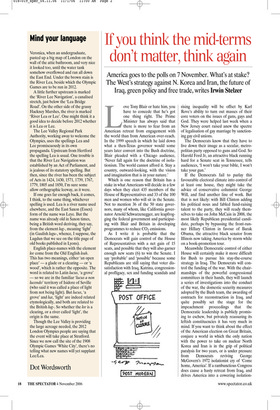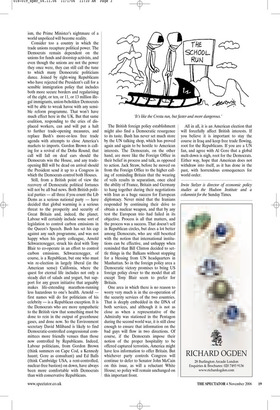If you think the mid-terms don’t matter, think again
America goes to the polls on 7 November. What’s at stake? The West’s strategy against N. Korea and Iran, the future of Iraq, green policy and free trade, writes Irwin Stelzer Love Tony Blair or hate him, you have to concede that he’s got one thing right. The Prime Minister has always said that there is more to fear from an American retreat from engagement with the world than from American over-reach. In the 1999 speech in which he laid down what a then-Texas governor would some years later convert into the Bush doctrine, Blair pleaded with a Chicago audience, ‘Never fall again for the doctrine of isolationism. The world cannot afford it. Stay a country, outward-looking, with the vision and imagination that is in your nature.’ Which is one reason that Britain has a stake in what Americans will decide in a few days when they elect 435 members of the House of Representatives and 33 of the 100 men and women who will sit in the Senate. Not to mention 36 of the 50 state governors, many of whom, like California governator Arnold Schwarzenegger, are leapfrogging the federal government and participating with Blair and Britain in developing programmes to reduce CO2 emissions.
As I write it is probable that the Democrats will gain control of the House of Representatives with a net gain of 15 seats, and possible that they will also garner enough new seats (6) to win the Senate. I say ‘probable’ and ‘possible’ because some Republicans are still saying that voter dissatisfaction with Iraq, Katrina, congressional profligacy, sex and funding scandals and rising inequality will be offset by Karl Rove’s ability to turn out masses of their core voters on the issues of guns, gays and God. They were helped last week when a New Jersey court raised anew the spectre of legalisation of gay marriage by sanctioning gay civil unions.
The Democrats know that they have to live down their image as a secular, metropolitan party opposed to guns and God. So Harold Ford Jr, an attractive black running hard for a Senate seat in Tennessee, tells audiences, ‘I won’t take your bible, I won’t take your gun.’ If the Democrats fail to parlay this favourable electoral climate into control of at least one house, they might take the advice of conservative columnist George Will, and find another line of work. But that is not likely: with Bill Clinton adding his political nous and fabled fund-raising talent to the party, they will ready themselves to take on John McCain in 2008, the most likely Republican presidential candidate, perhaps by bypassing the front-runner Hillary Clinton in favour of Barak Obama, the attractive black senator from Illinois now taking America by storm while on a book-promotion tour.
Meanwhile Democratic control of either House will certainly make it more difficult for Bush to pursue his stay-the-course strategy in Iraq. The Democrats will control the funding of the war. With the chairmanships of the powerful congressional committees in their hands, they will launch a series of investigations into the conduct of the war, the domestic security measures adopted by the Bush team, the awarding of contracts for reconstruction in Iraq, and quite possibly set the stage for the impeachment proceedings that the Democratic leadership is publicly promising to eschew, but privately reassuring its leftish constituencies it has very much in mind. If you want to think about the effect of the American election on Great Britain, conjure a world in which the only nation with the power to take on nuclear North Korea and Iran is in the grip of political paralysis for two years, or is under pressure from Democrats reviving George McGovern’s 1972 isolationist cry of ‘Come home, America’. If a rambunctious Congress does cause a hasty retreat from Iraq, and drives America into a cowering isolation ism, the Prime Minister’s nightmare of a world unpoliced will become reality.
Consider too a country in which the trade unions recapture political power. The Democrats remain dependent on the unions for funds and doorstep activists, and even though the unions are not the power they once were, they can still call the tune to which many Democratic politicians dance. Joined by right-wing Republicans who have rejected the President’s call for a sensible immigration policy that includes both more secure borders and regularising of the eight, or ten, or 11, or 13 million illegal immigrants, union-beholden Democrats will be able to wreak havoc with any sensible reform programme. That won’t have much effect here in the UK. But that same coalition, responding to the cries of displaced workers, can and will put a halt to further trade-opening measures, and replace Bush’s more-or-less free trade agenda with attempts to close America’s markets to imports. Gordon Brown is calling for a revival of the Doha Round; that call will fall on deaf ears should the Democrats win the House, and any tradeopening Bill will be dead on arrival should the President send it up to a Congress in which the Democrats control both Houses.
Still, from a British point of view the recovery of Democratic political fortunes will not be all bad news. Both British political parties — all three if you count the Lib Dems as a serious national party — have decided that global warming is a serious threat to the prosperity and security of Great Britain and, indeed, the planet. Labour will certainly include some sort of legislation to control carbon emissions in the Queen’s Speech. Bush has set his cap against any such programme, and was not happy when his party colleague, Arnold Schwarzenegger, struck his deal with Tony Blair to co-operate in an effort to control carbon emissions. Schwarzenegger, of course, is a Republican, but one who must win re-election in largely liberal (in the American sense) California, where the quest for eternal life includes not only a steady diet of salads and yogurt, but support for any green initiative that arguably makes life-extending marathon-running less hazardous to one’s health. Arnold first names will do for politicians of his celebrity — is a Republican exception. It is the Democrats who are more sympathetic to the British view that something must be done to rein in the output of greenhouse gases, and done now. So the Environment secretary David Miliband is likely to find Democratic-controlled congressional committees more friendly venues than those now controlled by Republicans. Indeed, Labour politicians, from Gordon Brown (think summers on Cape Cod, a Kennedy haunt; Gore as consultant) and Ed Balls (think Cambridge USA, a rent-controlled, nuclear-free bastion) on down, have always been more comfortable with Democrats than with conservative Republicans. The British foreign policy establishment might also find a Democratic resurgence to its taste. Bush has never set much store by the UN talking shop, which has proved again and again to be hostile to American interests. The Democrats, on the other hand, are more like the Foreign Office in their belief in process and talk, as opposed to action. Jack Straw, before he moved on from the Foreign Office to the higher calling of reminding Britain that the wearing of veils results in separatism, once cited the ability of France, Britain and Germany to hang together during their negotiations with Iran as a huge success for European diplomacy. Never mind that the Iranians responded by continuing their drive to obtain a nuclear weapon, and that by any test the European trio had failed in its objective. Process is all that matters, and the process was a success. That doesn’t sell in Republican circles, but does a lot better among Democrats, who are still besotted with the notion that international institutions can be effective, and unhappy when reminded that Bill Clinton decided to settle things in the Balkans without stopping for a blessing from UN headquarters in Manhattan. So in the foreign policy area a Democratic victory promises to bring US foreign policy closer to the model that all except Tony Blair seem to prefer for Britain.
One area in which there is no reason to worry very much is in the co-operation of the security services of the two countries. That is deeply embedded in the DNA of both services, and although it is not as close as when a representative of the Admiralty was stationed in the Pentagon during the second world war, it is still close enough to ensure that information on the bad guys will flow in two directions. Of course, if the Democrats impose their notion of the proper hospitality to be offered captured terrorists, America might have less information to offer Britain. But whichever party controls Congress will continue to defer to Senator John McCain on this issue, as will a reluctant White House; so policy will remain unchanged on this important front. All in all, it is an American election that will forcefully affect British interests. If you believe it is important to stay the course in Iraq and keep free trade flowing, root for the Republicans. If you are a UN fan, and agree with Al Gore that a global melt-down is nigh, root for the Democrats. Either way, hope that American does not withdraw into itself, as it has done in the past, with horrendous consequences for world order.
Irwin Stelzer is director of economic policy studies at the Hudson Institute and a columnist for the Sunday Times.



















































































































 Previous page
Previous page